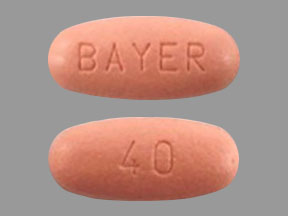Regorafenib and Alcohol/Food Interactions
There is 1 alcohol/food/lifestyle interaction with regorafenib.
Regorafenib Food/Lifestyle
Moderate Food Interaction
Depending on the amount of fat, food may help the absorption of regorafenib. You should take it with a low-fat breakfast at the same time everyday to maintain consistent blood levels and effects. Examples of a low-fat breakfast include: 2 slices of white toast with 1 tablespoon of low-fat margarine and 1 tablespoon of jelly, plus 8 ounces of skim milk (319 calories; 8.2 g fat); or 1 cup of cereal, 8 ounces of skim milk, 1 slice of toast with jam, apple juice, and 1 cup of coffee or tea (520 calories; 2 g fat). Avoid consuming grapefruit or grapefruit juice during treatment, as it may alter the blood levels and effects of the medication. Talk to your doctor or pharmacist if you have questions on how to take this or other medications you are prescribed. It is important to tell your doctor about all other medications you use, including vitamins and herbs. Do not stop using any medications without first talking to your doctor.
Switch to professional interaction data
Regorafenib drug interactions
There are 262 drug interactions with regorafenib.
Regorafenib disease interactions
There is 1 disease interaction with regorafenib which include:
More about regorafenib
- regorafenib consumer information
- Check interactions
- Compare alternatives
- Reviews (14)
- Side effects
- Dosage information
- During pregnancy
- Drug class: multikinase inhibitors
- Breastfeeding
- En español
Related treatment guides
Drug Interaction Classification
| Highly clinically significant. Avoid combinations; the risk of the interaction outweighs the benefit. | |
| Moderately clinically significant. Usually avoid combinations; use it only under special circumstances. | |
| Minimally clinically significant. Minimize risk; assess risk and consider an alternative drug, take steps to circumvent the interaction risk and/or institute a monitoring plan. | |
| No interaction information available. |
See also:
Further information
Always consult your healthcare provider to ensure the information displayed on this page applies to your personal circumstances.


